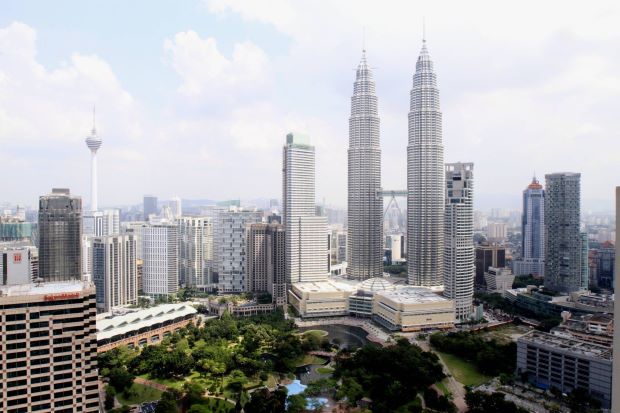US-China conflict may curb Malaysia’s GDP growth
KUALA LUMPUR: The United States-China trade war could adversely impact Malaysia’s Gross Domestic Product (GDP) growth by 1.3 per cent against what has been projected over the next two years.
CIMB Group  Chief Economist Dr Donald Hanna said this scenario was possible if the tariff war continued to escalate and shake the confidence of financial markets, especially if China sold its US Treasuries.
Chief Economist Dr Donald Hanna said this scenario was possible if the tariff war continued to escalate and shake the confidence of financial markets, especially if China sold its US Treasuries.
“This would result in reductions in global trade that would affect Malaysia as an open economy and also result in spiralling interest rates that may exacerbate the problem,” he told reporters on the sidelines of the ASEAN Roundtable Series on “Trade War And Its Impact On ASEAN” organised by CIMB ASEAN Research Institute (CARI).
However, he noted that the 1.3 per cent was a possible downside and not the likely outcome.
The US has already imposed 25 per cent tariffs on US$34 billion worth of Chinese goods, and duties on an additional US$16 billion of imports will kick in on Aug 23. The US government has also warned of 25 per cent tariffs on a further US$200 billion in Chinese imports.
Hanna also cited the possible impact of the trade war on growth among other ASEAN countries, including ASEAN6 (-1.4 per cent), Indonesia (-1.6 per cent ) Singapore (-2.0 per cent) and Thailand (-1.2 per cent).
He warned that with the scale of retaliation, the worst might be yet to come, adding that higher tariffs would not only hurt the growth of China and the US, but would also curb global growth should it escalate into a full-blown trade war.
Hanna said ASEAN would suffer chiefly through financial effects, adding that trade diversions to the region were unlikely to outweigh the sheer trade losses from higher US tariffs.
China’s exports, while having a high share of foreign value added, got a fairly small portion of that from ASEAN, he said.
According to Hanna, the biggest impact would be in the electronics sector in Malaysia and Singapore, food products in Indonesia, Malaysia and Thailand as well as wood products in Indonesia and Thailand.
“Due to the sheer magnitude of trade and the importance of finance in Singapore, it will experience the largest hits to its GDP from a trade war, especially one that implies higher US bond prices.
“Indonesia comes next (highest), hurt by higher value-added share in China’s exports, by its trade deficit and by the 42 per cent of the domestic bond market held by foreigners,“ he added.
Meanwhile, CARI Chairman Tan Sri Munir Majid, in his opening remarks, said ASEAN member states usually responded to a trade war on the basis of individual national interest.
He noted it was also in national interest to collectively make ASEAN economic integration and beyond more real in order to position the region as a bedrock of future expansion and prosperity.
“Structural market intervention by the US has occurred before. The Plaza Accord, which forced the revaluation of the Japanese yen and the Deutsche mark, resulted in a dramatic increase in Japanese investment in Southeast Asia,” he said.
The US-China trade war might cause regional industrial restructuring but investment flows must not be blocked and free trade must stand, said Munir.
“This is the regional challenge for ASEAN members: to be part of an economic regional bloc to generate growth and to compensate for a more protected US$19 trillion American market,” he added. – Bernama
Source: https://www.thestar.com.my/business/business-news/2018/08/14/us-china-conflict-may-curb-malaysia-gdp-growth/#T3DfsCitxqU7CXcr.99


 Thailand
Thailand




